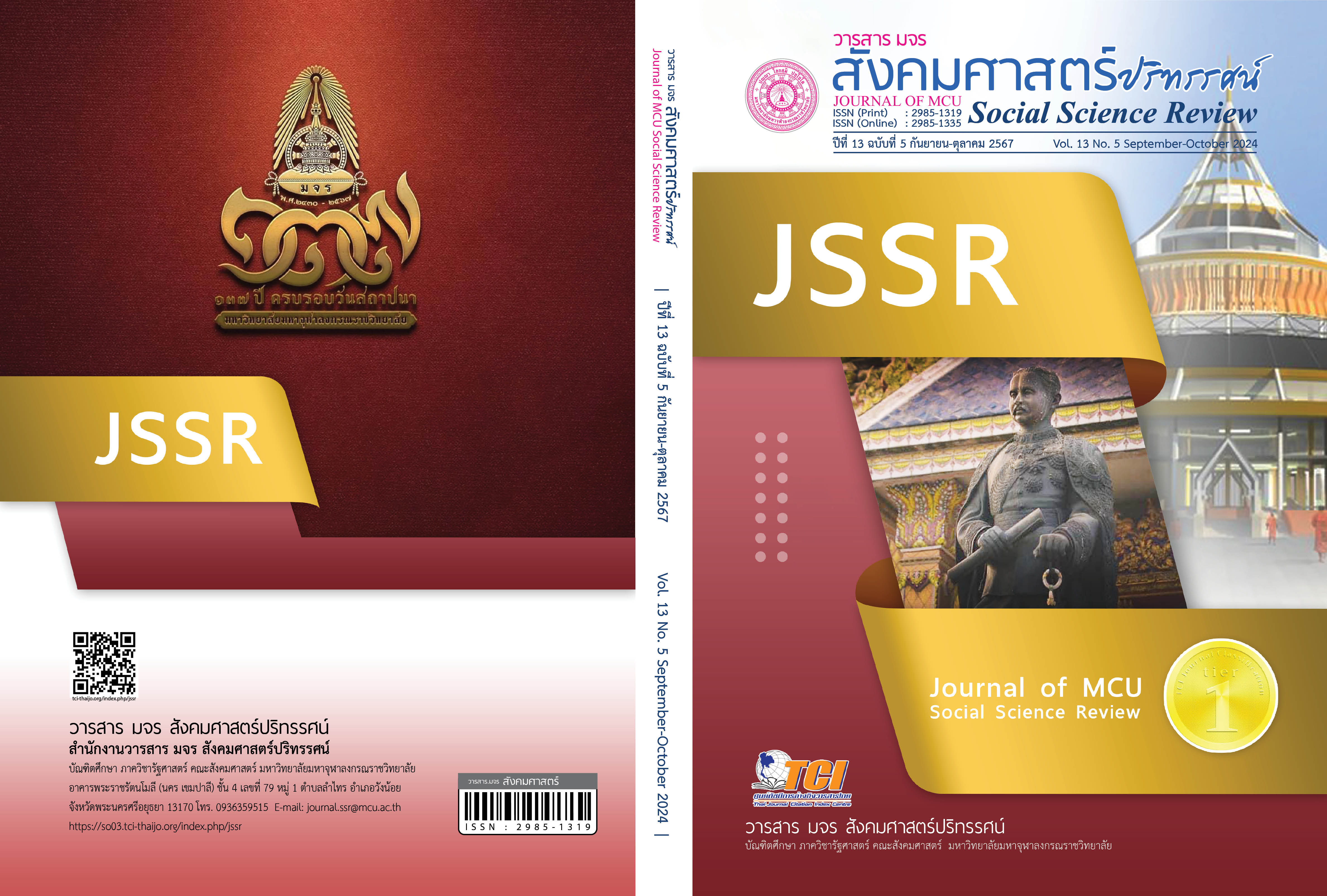แนวทางการพัฒนาหลักสูตรฐานสมรรถนะช่างไม้เครื่องเรือน และการตกแต่งภายในสำหรับอาคารชุด
คำสำคัญ:
หลักสูตรฐานสมรรถนะ, ช่างไม้เครื่องเรือน, การตกแต่งภายในบทคัดย่อ
บทความวิจัยนี้มีวัตถุประสงค์ 1. ศึกษาสมรรถนะ 2. วิเคราะห์กลุ่มสมรรถนะ 3. กำหนดแนวทางการพัฒนาหลักสูตรฐานสมรรถนะ การวิจัยแบ่งเป็น 3 ระยะ ระยะที่ 1 การศึกษาสมรรถนะ ใช้วิธีการสัมภาษณ์เชิงลึกกับผู้ให้ข้อมูลสำคัญ จำนวน 9 คน ที่เลือกแบบเจาะจง และวิเคราะห์ข้อมูลด้วยการวิเคราะห์เนื้อหา ระยะที่ 2 การวิเคราะห์กลุ่มสมรรถนะ
ใช้วิธีการสอบถามผู้ประกอบการ จำนวน 369 คน ที่เลือกแบบสุ่มอย่างง่าย วิเคราะห์ข้อมูลโดยใช้การวิเคราะห์องค์ประกอบหลักด้วยการหมุนแกนแบบตั้งฉากประเภท Varimax และระยะที่ 3 การกำหนดแนวทางการพัฒนาหลักสูตรฐานสมรรถนะ ใช้วิธีการสนทนากลุ่มกับผู้เชี่ยวชาญ จำนวน 7 คน ที่เลือกแบบเจาะจง และวิเคราะห์ข้อมูลด้วยการวิเคราะห์เนื้อหา
ผลการวิจัยพบว่า สมรรถนะประกอบด้วย ด้านความรู้ จำนวน 14 สมรรถนะด้านทักษะ จำนวน 14 สมรรถนะ และด้านคุณลักษณะส่วนบุคคล จำนวน 14 สมรรถนะ ผลการวิเคราะห์กลุ่มสมรรถนะได้ด้านความรู้ จำนวน 3 กลุ่ม ด้านทักษะ จำนวน 3 กลุ่ม และด้านคุณลักษณะส่วนบุคคล จำนวน 2 กลุ่ม โดยที่หลักสูตรฐานสมรรถนะช่างไม้เครื่องเรือนและการตกแต่งภายใน สำหรับอาคารชุด เป็นหลักสูตรระยะสั้น ประกอบด้วย 3 โมดูล ดังนี้ 1. การเป็นช่างไม้เครื่องเรือนและตกแต่งภายในที่ดี สำหรับอาคารชุด 2. การใช้เทคนิคผลิตงานเครื่องเรือนและตกแต่งภายในสำหรับอาคารชุด และ 3. ออกแบบเขียนแบบเครื่องเรือนและตกแต่งภายในเบื้องต้น สำหรับอาคารชุด
เอกสารอ้างอิง
กรมการจัดหางาน. (2561). สถานการณ์ตลาดแรงงานปี 2561. สืบค้น 11 สิงหาคม 2562, จาก www.doe.go.th/lmia
จิตติสา เจริญพานิช. (2555). การวิเคราะห์ความเสี่ยงในการก่อสร้างอาคารประเภทอาคารชุดพักอาศัย (วิทยานิพนธ์วิทยาศาสตรมหาบัณฑิต สาขาวิชานวัตกรรม
การพัฒนาอสังหาริมทรัพย์). กรุงเทพฯ: มหาวิทยาลัยธรรมศาสตร์.
ชนินทร์ มีโภคี. (2552). โครงการจัดทำยุทธศาสตร์การพัฒนาอุตสาหกรรมไม้และเครื่องเรือน. กรุงเทพฯ: สำนักงานเศรษฐกิจอุตสาหกรรม.
ชุติพงษ์ เหลียงกอบกิจ. (2552). การศึกษาแนวทางการวางกรอบการบริหารความเสี่ยงโครงการวางระบบภายใต้รูปแบบสัญญาว่าจ้างแบบสัญญาออกแบบ-ประมูล-ก่อสร้างและ ออกแบบ-ก่อสร้าง (วิทยานิพนธ์วิทยาศาสตรมหาบัณฑิต สาขาวิชาบริหารเทคโนโลยีวิทยาลัยนวัตกรรม). กรุงเทพฯ: มหาวิทยาลัยธรรมศาสตร์.
ณรงค์วิทย์ แสนทอง. (2547). เทคนิคการจัดทำ Job description บนพื้นฐานของ Competency และ KPI (พิมพ์ครั้งที่ 2). กรุงเทพฯ: เอช อาร์ เซ็นเตอร์.
ดิเรก กาญจนรูจี และคณะ. (2560). การมีส่วนร่วมของสถานประกอบการกับการกำหนดแนวทางยกระดับขีดความสามารถฝีมือแรงงานอุตสาหกรรมเครื่องเรือนของ
ประเทศไทย. กรุงเทพฯ: โรงพิมพ์แห่งจุฬาลงกรณ์มหาวิทยาลัย.
พงศ์ศรัณย์ อัศวชัยโสภณ และพัชรพร ลีพิพัฒน์ไพบูลย์. (2561). เมื่อโลกกําลังทำสงครามแย่งชิงคนเก่งประเทศไทยทำอะไรอยู่. สืบค้น 11 พฤษภาคม 2562, จาก https://shorturl.asia/kTF3e
วิจัยกรุงศรี. (2561). แนวโน้มธุรกิจ/อุตสาหกรรม ปี 2561-63 ธุรกิจรับเหมาก่อสร้าง. สืบค้น 11 พฤษภาคม 2562, จาก https://shorturl.asia/EmpDM
สำนักงานคณะกรรมการการอาชีวศึกษา. (2560). กรอบคุณวุฒิแห่งชาติฉบับปรับปรุง. กรุงเทพฯ: บริษัท พริกหวานกราฟฟิค จำกัด.
สำนักงานสถิติแห่งชาติ. (2560). การศึกษาแนวโน้มความต้องการแรงงานของตลาดแรงงานในประเทศไทยช่วงปี 2560-2564. สืบค้น 11 พฤษภาคม 2562, จาก www.nso.go.th>doclib13>ด้านสังคม>สาขาแรงงาน
อนุชัย รามวรังกูร. (2558). กระบวนทัศน์ทางการอาชีวศึกษา. กรุงเทพฯ: โรงพิมพ์แห่งจุฬาลงกรณ์มหาวิทยาลัย.
Chua, D. K. H. et al. (1999). Critical Success Factors for Different Project Objectives. ASCE Journal of Construction Engineering and Management, 125(3), 142-150.
Cuendet, S. et al. (2014). A Study of Carpenter Apprentices' Spatial Skills. Empirical Research in Vocational Education and Training, 6(3), 1-16.
khumpaisal, S. (2011). Analytic Approach to Risk Assessment in Thailand's Real Estate Development Industry (Doctor of Philosophy Thesis in School of the Built Environment Faculty of Technology and Environment). UK: Liverpool John Moores University.
Lioyd, C. & Cook, A. (1993). Implementing Standards of Competence. London: Kogan Page Limited.
Mc Clelland, C. D. (1973). Testing for Competence rather than for Intelligence. New Jersey: American Psychologist.
ดาวน์โหลด
เผยแพร่แล้ว
รูปแบบการอ้างอิง
ฉบับ
ประเภทบทความ
สัญญาอนุญาต
ลิขสิทธิ์ (c) 2024 วารสาร มจร สังคมศาสตร์ปริทรรศน์

อนุญาตภายใต้เงื่อนไข Creative Commons Attribution-NonCommercial-NoDerivatives 4.0 International License.
เพื่อให้เป็นไปตามกฎหมายลิขสิทธิ์ ผู้นิพนธ์ทุกท่านต้องลงลายมือชื่อในแบบฟอร์มใบมอบลิขสิทธิ์บทความให้แก่วารสารฯ พร้อมกับบทความต้นฉบับที่ได้แก้ไขครั้งสุดท้าย นอกจากนี้ ผู้นิพนธ์ทุกท่านต้องยืนยันว่าบทความต้นฉบับที่ส่งมาตีพิมพ์นั้น ได้ส่งมาตีพิมพ์เฉพาะในวารสาร มจร สังคมศาสตร์ปริทรรศน์ เพียงแห่งเดียวเท่านั้น หากมีการใช้ภาพหรือตารางหรือเนื้อหาอื่นๆ ของผู้นิพนธ์อื่นที่ปรากฏในสิ่งตีพิมพ์อื่นมาแล้ว ผู้นิพนธ์ต้องขออนุญาตเจ้าของลิขสิทธิ์ก่อน พร้อมทั้งแสดงหนังสือที่ได้รับการยินยอมต่อบรรณาธิการ ก่อนที่บทความจะได้รับการตีพิมพ์ หากไม่เป็นไปตามข้อกำหนดเบื้องต้น ทางวารสารจะถอดบทความของท่านออกโดยไม่มีข้อยกเว้นใดๆ ทั้งสิ้น





